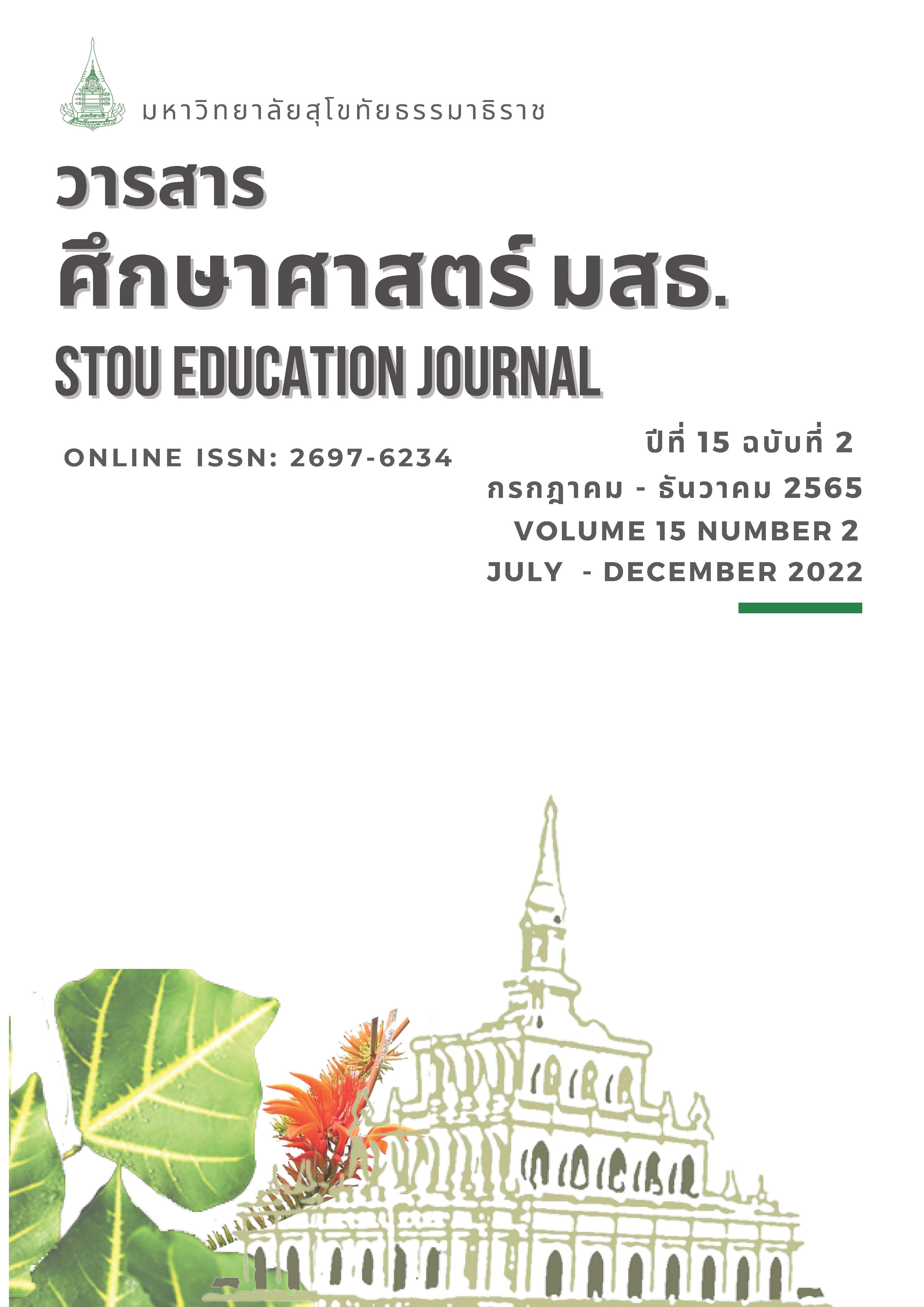Evaluation and Analysis of Lesson Plans for Teaching English Reading Skills
Main Article Content
Abstract
The objectives of this research were to 1) evaluate and analyze factors of lesson plans for teaching English reading skills in terms of the lesson objectives, learning and teaching activities, and measurement and evaluation; and 2) study opinions of the students who created those plans about the importance of components and causes of problems in the preparation of lesson plans. Sources of information for this study comprised 1) 25 lesson plans for teaching English reading skills written in the academic year 2021 by master's students majoring in English Language Teaching in the Department of Curriculum and Instruction, Sukhothai Thammathirat Open University; and 2) 10 students who prepared the aforementioned plans. The tools used in the research consisted of a form to evaluate and analyze a lesson plan for teaching English reading skills, and a semi-structured interview. The frequency of the data was calculated, and content analysis was utilized to categorize the data and draw inductive conclusions. The results of the research were as follows: 1) the evaluation and analysis of lesson plans for teaching English reading skills regarding the lesson objectives, learning and teaching activities, and measurement and evaluation revealed 2, 9, and 2 aspects that should be improved respectively; 2) based on the interview, the students expressed their opinions about problems in formulating a lesson plan. In addition, they jointly analyzed the causes and presented their needs relating to multiple areas of knowledge in the teaching of English reading skills to develop their instructional plans.
Article Details
References
ดนุลดา จามจุรี. (2563). การออกแบบการเรียนรู้สำหรับผู้เรียน Gen Z. http://www.curriculumandlearning.com/upload/Books/..Gen%20Z_1600319626.pdf
สุวิทย์ มูลคำ และคณะ. (2549). การเขียนแผนการจัดการเรียนรู้ที่เน้นการคิด (พิมพ์ครั้งที่ 2).อี เค บุ๊คส์.
อารีรักษ์ มีแจ้ง. (2560). การพัฒนาชุดฝึกอบรมผ่านเว็บเรื่อง การสอนภาษาอังกฤษแบบบูรณาการทักษะสำหรับครูผู้สอนภาษาอังกฤษระดับมัธยมศึกษา. วารสารศึกษาศาสตร์ มหาวิทยาลัยนเรศวร,19(4), 110-131.
อารีรักษ์ มีแจ้ง และวรรณประภา สุขสวสดิ์. (2565). แผนการจัดการเรียนรู้วิชาภาษาอังกฤษ: คุณภาพและประสิทธิภาพการสอน. สันติศิริการพิมพ์.
อุบลวรรณ ส่งเสริม และแม้นมาศ ลีลสัตยกุล. (2555). การพัฒนากระบวนการจัดการเรียนการสอนเพื่อพัฒนาความสามารถในการเขียนแผนการจัดการเรียนรู้สําหรับนักศึกษาครู.วารสารศึกษาศาสตร์ มหาวิทยาลัยศิลปากร,9(2),115-127. http://www4.educ.su.ac.th/2013/images/stories/reserch/journal/55/22.pdf
Aebersold, J. A., & Field, M. L. (1997). From reader to reading teacher. Cambridge University Press
Bilonozhko, N., & Syzenko, A. (2020). Effective reading strategies for generation Z using authentic texts. Arab World English Journal: Special Issue on the English Language in Iraqi Context, 121- 130. https://dx.doi.org/10.24093/awej/elt2.8
Bruggink, M. et al., (2002). Putting PIRLS to use in classrooms across the globe, IEA research for educators 1. https://doi.org/10.1007/978-3-030-95266-2_2
Centre for Teaching Excellence. (2021). Lesson planning. https://cte.smu.edu.sg/approach-teaching/integrated-design/lesson-planning
Chawwang, N. (2008). An investigation of English reading problems of Thai 12 th grade students in Nakornratchima Educational Regions 1,2,3, and 7. (Master’s thesis Srinakharinwirot University). http://thesis.swu.ac.th/swuthesis/Eng(M.A.)/Nongnat_C.pdf
Chinokul, S. (1999). Development of English reading skills. Department of Foundation of Education: Chulalongkorn University.
Fitriani, N.Y. & Budiarta, R. (2021). An analysis of teacher’s lesson plan for learning English through google classroom in junior high school. Jurnal Pendidikan Bahasa Inggris Undiksha, 9(1), 98-105. file:///C:/Users/edasmare/Downloads/An_Analysis_of_ Teachers_Lesson_Plan_for_Learning_%20(3).pdf
Harmanto, B. (2013) Teaching English to generation Z students (New concept of young learners). 74-81. http://eprints.umpo.ac.id/id/eprint/1752
Hayikaleng, N., Nair, S. M., & Krishnasamy, H. N. (2016). Thai students’ motivation on English reading comprehension. International Journal of Education and Research, 4(6), 477-486. https://www.ijern.com/journal/2016/June-2016/41.pdf
Jalongo, M. R., Rieg, S. A., & Helterbran, V. R. (2007). Planning for learning: Collaborative approaches to lesson design and review. Teachers College Press.
Jantarach, V. & Soontornwipast, K. (2018). EFL student teachers’ lesson planning processes: A grounded theory study. Arab World English Journal, 311-330. file:///C:/Users/edasmare/Downloads/SSRN-id3258831%20(1).pdf
Jensen, L. (2001). Planning lessons. In Celce-Murcia, Marianne (Ed.), Teaching English as a second or foreign language (3rd ed., pp. 403-408). Heinle & Heinle.
Khan,I. A. (2011). Lesson planning for reading: an effective teaching strategy in EFL classrooms. Elixir Social Studies, 37,3958-3964. file:///C:/Users/edasmare/Downloads/lessonplanning.pdf
Krathwohl, D. R. (2002). A revision of Bloom’s taxonomy: An overview. Theory into practice, 41(4), 212-218. https://www.depauw.edu/files/resources/krathwohl.pdf
König, J. Bremerich-Vos, A., Buchholtz, C., & Glutsch, N. (2020). General pedagogical knowledge, pedagogical adaptivity in written lesson plans, and instructional practice among preservice teachers. Journal of Curriculum Studies, 52(6), 800-821. https://doi.org/10.1080/00220272.2020.1752804
McLaughlin, M. (2012). Reading comprehension: What every teacher needs to know. The Reading Teacher, 65(7), 432-440. https://www.reading.org
Mejang, A. & Suksawas, W. (2021). The impacts of a face-to-face training in combination with line application and professional learning communities on English teacher development. English Language Teaching. 14(4), 25-33. https://eric.ed.gov/?id=EJ1293061.
Musingafi, M. C. C., Mhute, I., Zebron, S., & Kaseke, K. E. (2015). Planning to teach: Interrogating the link among the curricula, the syllabi, schemes and lesson plans in the teaching process. Journal of Education and Practice, 6(9), 54-59. https://files.eric.ed.gov/fulltext/EJ1082472.pdf
National Council of Teachers of English, (2019). The act of reading: Instructional foundations and policy guidelines. https://ncte.org/statement/the-act-of-reading/
Pal, D., Taywade M, Alekhya G. (2022). Designing a comprehensive lesson plan: A crucial aspect in improving the teaching-learning process. Curr Med Issues. 20,48-51. https://www.cmijournal.org/text.asp?2022/20/1/48/337311
Richards, J. C., & Bohlke, D. (2011). Creating effective language lessons. Cambridge University Press.
Sitthitikul, P. (2020). Proposed directions for the meaningful learning in the Thai EFL context. Journal of English Language and Linguistics, 1(1), 1-8. https://drive.google.com/file/d/1aupArsHaWRMF296qSqKpTzaCXDnOuG72/view
Sriprom, C., Rungswang, A., Sukwitthayakul, C., & Chansri, N. (2019). Personality traits of Thai gen Z undergraduates: Challenges in the EFL classroom? PASAA: Journal of Language Teaching and Learning. 57, 165-190. https://files.eric.ed.gov/fulltext/EJ1224422.pdf


